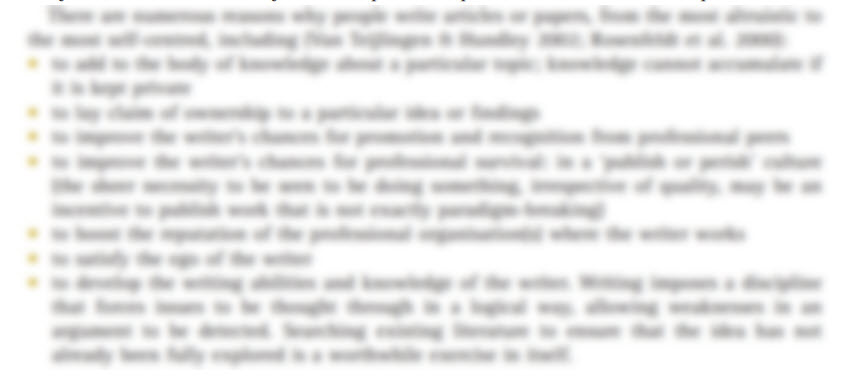If you need to write from home or in a new or unfamiliar environment, you might find it challenging to stay focused. This guide suggests ways to help you maintain focus and improve your productivity when writing at home. In this guide I refer to ‘writing sessions’. These are activities planned in advance, last for a certain period of time and during which you only write, rewrite or edit.
1. Create a Zone of Silence
The principles of creating a Zone of Silence at home are similar to creating a zone of silence in your workplace. The rules of the Zone of Silence are that you:
- Work in an area that is devoted to writing.
- Only work on one project at a time.
- Only have access to the writing and reading materials needed for your current project.
- Turn off your access to the internet and telephone.
- Limit any unnecessary interruptions and distractions.
Although these conditions may be hard to meet at home, the following suggestions may also help you follow these rules:
- Complete all internet-based research before you start your writing sessions.
- Wear headphones and listen to background or instrumental music while writing.
- Choose times to write when your house or apartment is empty or quiet.
- If you normally write with a desktop computer, occasionally try switching to writing with a laptop; you may then find it easier to confine yourself to smaller writing-devoted areas.
2. Turn writing into a habit
When you regularly repeat a task, it takes gradually takes less motivation to start and complete this task.
Try setting up a writing routine by planning regular writing sessions, either daily or every second day. However, don’t be too optimistic when setting time limits for your writing sessions. It can be difficult to turn writing into a habit if you think you need to set aside large blocks of time before you can write (e.g. a full day or 2-3 days in a row), so establish a writing routine by starting small. Shorter tasks are easier to complete and are less likely to be put off.
First allocate short writing sessions, e.g. 15-minute duration. As you develop your routine, gradually increase your time limit to 60-minutes per writing session. Allocate longer sessions if appropriate or if working to a deadline.
Don’t be too harsh on yourself if you skip some days while developing your routine. Don't let the fact that you’ve skipped a few days be an excuse for avoiding further attempts to establish a routine.
3. Get started by reviewing your previous draft
Getting started is a common problem no matter where you write. One suggestion is to routinely begin each writing session by first reviewing what you wrote during your last writing session. Refreshing your thinking about what you were working on previously may make it easier to start writing. But first print out your previous draft instead of just viewing it on screen, then edit it with a pen. Periodically printing out your document makes it easy to view your draft in its entirety which is difficult to do via a computer screen. When you finish each writing session, print out your final version, so you have physical evidence of your writing progress and are ready for your next session.
4. Find a writing buddy
A writing buddy is someone you might work or study with who also needs to write regularly. A writing buddy is someone who reads your writing and gives you feedback and in return you read their writing and give them feedback. You can email documents to each other and critique each other's work for clarity or complete general editing or proofreading.
You might find that committing to swap editing and feedback will help you be more productive and to create regular writing routines. You might also want to schedule regular catch-ups to discuss your work, either face-to-face or through online meeting platforms.
Remember…
Avoid creating unrealistic expectations on how much writing you can do in an unfamiliar environment. It is unrealistic to expect that we can be super-productive writing machines that can write anything, anywhere and at any time. Aim to write in intensive pre-organised, short blocks of time in an environment that is as comfortable and distraction-free as possible.
Find out more about our new online course...
Now includes feedback on your writing Learn more...
SUBSCRIBE to the Writing Clear Science Newsletter
to keep informed about our latest blogs, webinars and writing courses.
FURTHER READING
- The zone of silence: reducing distraction in the writing workplace
- The essentials of science writing: identify your target audience
- The essentials of science writing: plan before you write
- The essentials of science writing: What is science writing?
- 8 steps to writing your first draft
- Two ways to be an inefficient writer
- Work-procrastination: important stuff that keeps us from writing
Any suggestions or comments please email admin@writingclearscience.com.au







